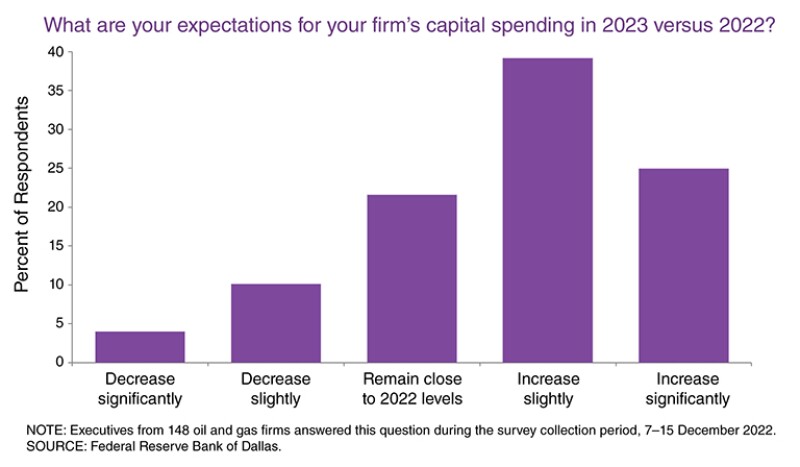Some oil and gas companies, the major source of employment for SPE members, revealed their budgets for 2023 and the following years. A look at where the companies plan to direct their spending sheds light on the areas of expected job availability and needed competencies. The numbers show companies’ major allocation of funds for oil and gas exploration and production and concerted efforts to reduce their carbon footprint by reducing emissions resulting from their current operations (whether it is under scope 1, 2, or 3) and increasing efforts to develop new sources of energy. Oil and gas companies’ plans reflect a strategy that may be described as Petroleum ++.
The Federal Reserve Bank of Dallas conducts a quarterly energy survey, and in its most recent one (released 29 December), it asked respondents about expectations for capital spending in 2023 vs. 2022. Most reporting companies indicated they plan to increase their capex spending within a range of 8 to 25%. Some major international companies announced additions to their capital budgets. While some reported their plans for 2023, others reported 5-year plans.

I wish all were reported the same way with specific numbers for various activities so that we engineers can input all values in a table and reach quantitative conclusions, but this is not the case, and we must review what is being reported and reach a generalized understanding about future directions.
For example, Chevron reported about $14 billion capex in 2023 with 82% going to upstream oil and gas projects, 14% towards the effort to lower its carbon footprint, and 7% toward new energy developments. ExxonMobil reported a capex budget of between $20–25 billion annually through 2027 with 15% directed to efforts to lower emissions. TotalEnergies plans to increase its annual budget by about 14% in the 2023–2025 period to about $14 billion per year and appears to be targeting about $6 billion for new oil and gas assets and $4 billion for new energy. Saudi Aramco approved $296 billion for 2023 and has created a $1.5-billion sustainability fund to invest in technology that can support a stable and inclusive energy transition. Petrobras will increase investment during the 2023–2027 period to $78 billion with 83% earmarked for traditional exploration and production activities, 6% to reduce carbon emissions, and about 1% for the decarbonization fund.
The directions from the announced spending plans of oil and gas companies indicate that more than about 80% of their budgets are directed toward traditional oil and gas exploration and production and concerted efforts to reduce emissions and carbon footprint, and measurable sustainable investment in new energy. This clearly shows SPE members, employers, and educational institutions the needed competencies and technical skills that we all need to continue our work and provide the world with the energy it needs. As mentioned earlier this may be summarized by Petroleum ++. It is also reasonable to expect that with the increase in budgets of oil and gas companies, there will be an uptick in the employment of petroleum professionals. A modest increase that we just witnessed in the number of SPE members in 2022 for the first time in a few years may be a good indication.
How To Gain Petroleum Engineering Skills
Continuing with the trend that I started last month to highlight the services available to all SPE members, I would like to share information about the SPE training program by answering some of the questions I am being asked as I meet members during travel. I want to thank Carrie Chykaliuk, SPE Training and Events Specialist, for helping me provide these answers.
What are the main strategies/objectives of SPE training?
The SPE training program actively supports the SPE Mission and Vision statements with its strategy of “providing opportunities for professionals to enhance their technical and professional competence” through educational offerings. From instructor-led courses to online learning, our topics and experts are carefully selected to supply necessary and current resources that help professionals improve their expertise and remain up to date on best practices and technical information in a dynamic industry.
The SPE staff works with global experts to source classes and build a catalog that not only meets current topical needs but is forward-looking so industry professionals can efficiently adhere to industry regulations and standards while meeting the world’s future energy demands. The courses offered through SPE are strategically chosen and scheduled to
- Enhance SPE events by complementing the events’ technical program to advance attendee understanding.
- Offer various formats to meet members’ needs regardless of their area of expertise, level of experience, or physical location.
Why would a member want to take SPE courses? What are the advantages over commercially offered training?
As an SPE member benefit, courses are offered to all members at a discounted or complimentary rate vs. the nonmember rate. Income from the courses is reinvested into the program to support the continuation of SPE professional development. SPE course scheduling and the relevance of the catalog are managed by SPE staff under the advisement of SPE subject matter expert volunteers (SMEs) as they monitor industry trends. Therefore, when you take an SPE course, you are getting cutting-edge, current technical information from the very experts who pioneered these technologies as well as content customized specifically to the audience’s background and learning goals.
SPE course surveys unanimously show that the number one reason an attendee took a course alongside an SPE event was because of the unique convenience factor, with the high quality of the SPE courses being a close second. Attendees can attend an event and receive credit hours by taking an adjoining course, saving both money on travel expenses as well as making the most of their trip.
While SPE course material and SMEs are top-notch, the unique SPE community is evermore present in the SPE course classrooms. The ability to take courses alongside industry professionals, both members and nonmembers, further extends the person’s professional circle and builds lifelong connections that are essential to their career path.

What are the training courses currently available to members? Where can the courses, descriptions, and dates and times offered be found?
SPE training courses are offered with events as standalone and via private, in-house options in both online and hybrid formats. Courses are offered globally and throughout the year with flexible scheduling options, so any member anywhere can fulfill their learning and development needs on their own schedule. Options may include
- During the week or weekend.
- During and after work hours.
- On-demand/recorded courses.
- Online education.
- Hybrid solutions.
The course offerings can be found
- On the Training Courses Schedule of Events and direct SPE event websites (when in conjunction with events).
- Online Education site (online and on-demand course offerings).
- Via requests for private, in-house courses.
How does SPE decide which courses should be offered? How do we address the expected needs of our members for a given subject based on the ongoing developments in technology and business activities?
The SPE training staff works with global SMEs, advisors, technical directors, and committee members to source classes to be offered in the training catalog. These individuals understand trending topics and select complementary courses for events. SPE staff rely heavily on these expert volunteer members to ensure we not only remain current with course content and topics, but we proactively anticipate the trends of the industry and the energy demands. With these unique staff-to-expert interactions, staff receive guidance and are among the first to know about new and emerging technologies so that all courses can be meticulously and specifically chosen with strategic intention.
If a member wants to offer a course through SPE, what steps should they take to get their course included?
SPE is always looking for new training course ideas, particularly in the areas of emerging technologies. SMEs can propose a new training course for review by completing the New Course Submission Form, which begins the approval process. Each regional office has technical experts that work directly with SPE staff to review each course. The training program will release a new form and procedure for new course approval in the spring of 2023 which will streamline the current process and enhance the efficiency of the course topic/catalog management.
Can a member take a course while not attending a conference?
Both members and nonmembers can take courses even if they are not attending the accompanying conference and would elect for “Training Course Only” during their registration process for that option. While training courses are offered in conjunction with events, they are also offered as standalone, on-demand, in online and hybrid formats, as well as in-house, so there are extensive opportunities for professionals to attend a course outside of events.
Are new technology developments being used in offering courses? Online offerings?
All SPE courses, both online and in-person, are kept up to date with the most current and trending information. Case studies and class exercises are used to enhance the technical information and are continually updated by the instructors so that they are relevant to the current industry technologies. Instructors will often use software in classes and take field trips to extend the course material. Additional resources such as SPE papers, articles, books, videos, and many other methods are prevalent throughout all the SPE course offerings. Classes are audited and surveyed to ensure top quality, and feedback from attendees is thoroughly reviewed after each class. SPE staff work with advisors, technical directors, and committee members to coordinate efforts when selecting course topics, building and sourcing new courses, and ensuring that we use all necessary methods/exercises for the delivery of the courses. SPE training is not just focused on the delivery of technical information, but also on immersing an attendee in all aspects of the topic to give them a full and rewarding experience.
Are SPE courses available for in-house training?
One of the most fruitful benefits of the SPE training program is our in-house offering. In‑house training allows for any of the 300+ courses to be customized to a company’s specific needs and is delivered privately for a unique tailored experience at the company’s facility (or virtually) and at requested times, to accommodate staff’s busy schedules.
Meticulously designed and facilitated by industry experts and SPE staff, each in-house training course will provide the opportunity for the client to set the objectives and focus areas while having one-on-one time with the instructor. In addition to being convenient and offering content flexibility, they are also cost effective since they are offered at a discounted price as compared to the standard registration fees. A company can stretch its training budget by focusing resources on expanding knowledge, and not expense accounts.
Being a part of SPE means SPE training staff work with the members and nonmembers to find a learning solution that fits their needs. If you cannot find what you need within our current offerings, contact the SPE staff at trainingcourses@spe.org for advice and resources.
Until next month!
To help the reader learn more about SPE training, here are useful links that I encourage you to visit.


